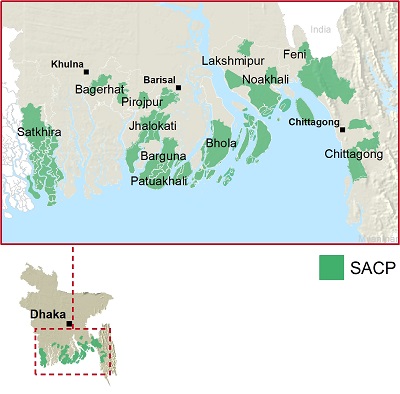Smallholder Agricultural Competitiveness Project (SACP)
IfadAssetRequestWeb
Publicador de Conteúdo
Smallholder Agricultural Competitiveness Project
Although Bangladesh is considered a lower-middle-income country overall, the proportion of people living in extreme poverty in rural areas is still three times higher than in urban areas. Food security and undernutrition continue to be major concerns. Women are particularly affected by poverty, as they have fewer opportunities for employment, and rural youth are the most likely to migrate to cities to seek employment.
The Smallholder Agricultural Competitiveness Project (SACP) aims to significantly increase incomes and food and nutrition security by helping smallholder farmers be more responsive and competitive in producing diverse, high-value crops and marketing fresh and processed agricultural products. The project will provide technical training and access to finance.
The project will reach 250,000 rural households in southern Bangladesh, where the highest percentage of rural poor reside. Women, youth and disadvantaged households will be specifically targeted.

President's reports
Project design reports
Project design reports
Supervision and implementation support documents
Supervision and implementation support documents
Environmental and social impact assessment
Final environmental and social management framework
Interim (mid-term) review report
Interim (mid-term) review report
Resettlement action framework
PCR digest
Special study
Project list
Audit and Financial Statements
Audit and Financial Statements
2023-Ministry of Finance-AUDIT_REPORT
2022-Ministry of Finance-AUDIT_REPORT
2021-Ministry of Finance-AUDIT_REPORT
2020-Ministry of Finance-AUDIT_REPORT
Project completion report
Project completion report
Co-financiers
Related
Related
Tracking investments in Tunisia with remote sensing
Many elements involved in IFAD-funded projects. As long as an element’s precise geographic coordinates are known, satellite imagery can be used to monitor any changes that have taken place.